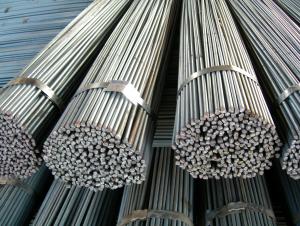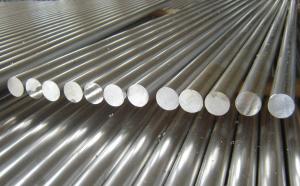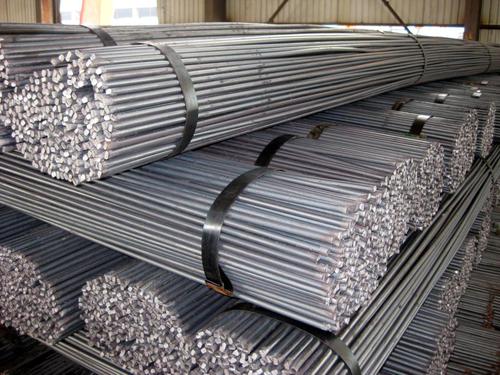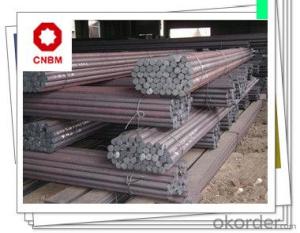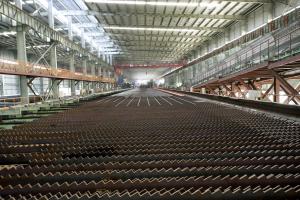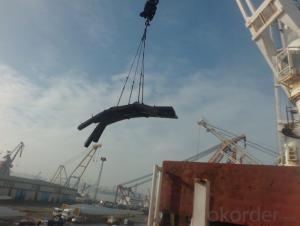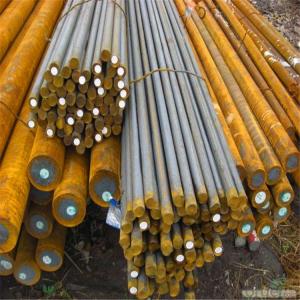Hot Rolled Steel Round Bar 40Cr
- Loading Port:
- China Main Port
- Payment Terms:
- TT or LC
- Min Order Qty:
- 100 m.t.
- Supply Capability:
- 2000 m.t./month
OKorder Service Pledge
OKorder Financial Service
You Might Also Like
Product Applications:
Hot Rolled Steel Round Bar are ideal for a large number of architectural and engineering structures. Or it can be used in construction of plants for the production of steel house frames, high-voltage transmission towers, bridges, vehicles, boilers, containers, ships, etc
Product Advantages:
OKorder's Hot Rolled Steel Round Bars are durable, strong, and with competitive price
Main Product Features:
· Premium quality
· Prompt delivery & seaworthy packing (30 days after receiving deposit)
· Corrosion resistance
· Can be recycled and reused
· Mill test certification
· Professional Service
· Competitive pricing
Product Specifications:
Manufacture: Hot rolled
Grade: Q195 – 235
Certificates: ISO, SGS, BV, CIQ
Length: 6m – 12m, as per customer request
Packaging: Export packing, nude packing, bundled
Diameter | Mass | Diameter | Mass | Diameter | Mass |
(mm) | (kg/m) | (mm) | (kg/m) | (mm) | (kg/m) |
6 | 0.22 | 22 | 2.98 | 53 | 17.30 |
7 | 0.30 | 24 | 3.55 | 56 | 19.30 |
8 | 0.40 | 25 | 3.85 | 60 | 22.20 |
9 | 0.50 | 26 | 4.17 | 63 | 24.50 |
10 | 0.62 | 28 | 4.83 | 65 | 26.00 |
11 | 0.75 | 30 | 5.55 | 70 | 30.20 |
12 | 0.89 | 32 | 6.31 | 75 | 34.70 |
13 | 1.04 | 34 | 7.13 | 80 | 39.50 |
14 | 1.21 | 36 | 7.99 | 85 | 44.50 |
15 | 1.39 | 38 | 8.90 | 90 | 49.90 |
16 | 1.58 | 40 | 9.86 | 95 | 55.60 |
17 | 1.78 | 42 | 10.90 | 100 | 61.70 |
18 | 2.00 | 45 | 12.50 | 120 | 88.85 |
19 | 2.23 | 48 | 14.20 | 140 | 120.93 |
20 | 2.47 | 50 | 15.40 | 150 | 138.82 |
FAQ:
Q1: Why buy Materials & Equipment from OKorder.com?
A1: All products offered byOKorder.com are carefully selected from China's most reliable manufacturing enterprises. Through its ISO certifications, OKorder.com adheres to the highest standards and a commitment to supply chain safety and customer satisfaction.
Q2: How do we guarantee the quality of our products?
A2: We have established an advanced quality management system which conducts strict quality tests at every step, from raw materials to the final product. At the same time, we provide extensive follow-up service assurances as required.
Q3: How soon can we receive the product after purchase?
A3: Within three days of placing an order, we will begin production. The specific shipping date is dependent upon international and government factors, but is typically 7 to 10 workdays.
Q4:What is the package
A4: Standard seaworthy packing or as customer required; all goods are packed in bundle with steel strips and shipped by break bulk vessel or container
Images:
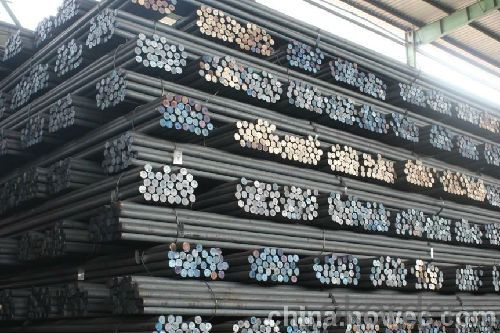
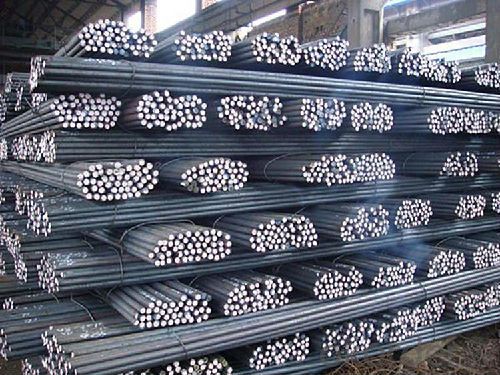
- Q: What are the advantages of using mild steel round bars?
- Using mild steel round bars in various applications offers several advantages. To begin with, mild steel round bars exhibit exceptional strength and durability. They have the capacity to withstand high levels of stress and pressure, rendering them suitable for use in construction, manufacturing, and engineering ventures. The robustness of mild steel round bars ensures that they do not readily deform or fracture under heavy loads, providing a dependable and long-lasting solution. Furthermore, mild steel round bars possess favorable weldability. They can be easily joined or affixed to other materials through welding, granting them versatility across different applications. This allows for effortless customization and flexibility in design, as the bars can be shaped and connected to form intricate structures or components. In addition, mild steel round bars feature a low carbon content, making them more cost-effective in comparison to alternative steel types. They are readily available and affordable, making them a popular choice within various industries. Moreover, mild steel round bars exhibit excellent machinability. They can be effortlessly cut, drilled, and shaped using common machining techniques, facilitating easy fabrication and customization. This renders them suitable for a wide array of applications, ranging from construction to automotive components. Lastly, mild steel round bars offer commendable corrosion resistance. Although they may not possess the same level of corrosion resistance as stainless steel, they still provide adequate protection against rust and other forms of corrosion. This renders them suitable for outdoor applications or environments with high levels of humidity or exposure to moisture. In conclusion, the advantages of utilizing mild steel round bars include their exceptional strength and durability, favorable weldability, cost-effectiveness, machinability, and corrosion resistance. These factors make them a reliable and versatile choice for various industrial and construction applications.
- Q: What are the different types of steel round bar alloys for improved toughness?
- Some of the different types of steel round bar alloys that are known for improved toughness include alloy steels such as 4140, 4340, and 8620, as well as tool steels like H13 and D2. These alloys are specifically designed to have enhanced toughness properties, making them suitable for applications where high strength and resistance to wear and impact are required.
- Q: Can steel round bars be used in the production of medical equipment?
- Yes, steel round bars can be used in the production of medical equipment. Steel is a common material used in the manufacturing of medical devices and equipment due to its strength, durability, and versatility. Steel round bars can be used to create various components of medical equipment such as surgical instruments, orthopedic implants, diagnostic tools, and hospital furniture. The properties of steel, such as its resistance to corrosion and ability to be sterilized, make it a suitable choice for use in the medical industry where hygiene and patient safety are of utmost importance. Additionally, steel round bars can be easily machined and fabricated into different shapes and sizes, allowing for the customization of medical equipment to meet specific requirements.
- Q: What are the different surface conditions for steel round bars?
- Steel round bars can have a variety of surface conditions depending on how they will be used and how they are made. Some commonly used surface conditions for steel round bars are: 1. Hot Rolled: This is the most common surface condition for steel round bars. It involves heating the steel above its recrystallization temperature and then rolling it through hot rolling mills. This process gives the steel a rough surface with a layer of scale that needs to be removed. 2. Cold Drawn: In this surface condition, the steel round bars are pulled through a die at room temperature. This creates a smoother and more precise surface finish. Cold drawn bars have better dimensional accuracy and surface quality compared to hot rolled bars. 3. Peeled: Steel round bars can also be peeled to remove the scale layer and achieve a smooth surface finish. This process involves rotating the bar against a cutting tool, resulting in a clean and shiny surface. 4. Ground: Grinding is another method used to achieve a smooth surface finish on steel round bars. It involves removing material from the surface using abrasive belts or wheels, resulting in a precise and consistent surface. 5. Polished: Polishing is a surface treatment that enhances the appearance and smoothness of steel round bars. It involves using abrasive compounds and buffing wheels to create a reflective and mirror-like finish. 6. Coated: Steel round bars can be coated with different materials to improve their resistance to corrosion or enhance their appearance. Common coatings include zinc, chrome, nickel, and various types of paint. The choice of surface condition for steel round bars depends on the specific application and desired properties. Each surface condition offers different advantages in terms of appearance, corrosion resistance, and mechanical properties.
- Q: What are the weight calculations for steel round bars?
- One can determine the weight of steel round bars through a simple formula. To calculate the weight of a steel round bar, multiply the square of its diameter in millimeters by the length in meters, and then multiply the result by the specific weight of steel, which is typically around 7.85 grams per cubic centimeter. The weight of a steel round bar can be calculated using the following formula: Weight = (Diameter^2 x Length x Specific Weight of Steel) / 1000 In this formula: - Diameter represents the diameter of the round bar in millimeters. - Length indicates the length of the round bar in meters. - Specific Weight of Steel refers to the density of steel, usually 7.85 grams per cubic centimeter. - 1000 is employed to convert the weight from grams to kilograms. It is essential to consider that this formula assumes the round bar is made solely of steel and does not take into account any variations in the specific weight among different steel alloys. Moreover, it is crucial to maintain consistent units throughout the calculation, whether millimeters or meters, for accurate results.
- Q: How do you calculate the moment of inertia of a steel round bar?
- To calculate the moment of inertia of a steel round bar, you need to know its mass and the radius of gyration. The moment of inertia can be determined using the formula I = (1/4) * π * r^4, where I represents the moment of inertia and r is the radius of the round bar.
- Q: What are the different types of steel round bar alloys for improved machinability?
- There are several types of steel round bar alloys that are specifically designed to improve machinability. These alloys are chosen for their ability to be easily shaped, cut, and drilled, which is crucial in various machining applications. Some of the commonly used steel round bar alloys for improved machinability include: 1. 12L14 Steel: This alloy contains added lead, which enhances its machinability. The presence of lead lubricates the cutting tool, reduces friction, and improves chip formation during the machining process. 2. 1215 Steel: Similar to 12L14, 1215 steel also contains added lead, which provides excellent machinability. This alloy is known for its high cutting speeds, smooth surface finish, and improved chip control. 3. 4140 Steel: Although not specifically designed for machinability, 4140 steel is known for its excellent overall machining properties. With proper heat treatment, this alloy offers good strength, toughness, and wear resistance while still maintaining a reasonable level of machinability. 4. 1018 Steel: This low carbon steel alloy is widely used for its excellent machinability. It is easy to cut, drill, and shape, making it suitable for a variety of machining operations. However, it may have lower strength compared to some other alloys. 5. 8620 Steel: This alloy is specifically designed for case hardening, but it also offers good machinability. 8620 steel can be easily machined, providing high surface finish and dimensional accuracy. 6. 416 Stainless Steel: This stainless steel alloy provides good machinability due to its sulfur content. It is used in applications where corrosion resistance is required along with improved machinability. These are just a few examples of steel round bar alloys that are chosen for their enhanced machinability. The selection of the appropriate alloy depends on the specific machining requirements and the desired properties in the final product.
- Q: What's the difference between bearing steel and round steel?
- Steel is an important material for national construction and the realization of the four modernization indispensable, its wide application, wide variety, according to the different steel profile is generally divided into sections and plates, pipes and metal products four categories, in order to facilitate the organization of steel production, supply management and order management, and divided into heavy rail, light rail, large steel, and steel, small steel, steel cold-formed steel, high-quality steel, wire rod, steel plate, steel sheet, electrical silicon steel sheet, strip steel, seamless steel pipe, welded steel pipe, steel, metal products and other varieties.
- Q: What are the limitations of using steel round bars?
- Using steel round bars in various applications has several limitations. One such limitation is their vulnerability to corrosion. Steel round bars, particularly those made of carbon steel, are prone to rusting when exposed to moisture or harsh environments. This can have a significant impact on their structural integrity and lifespan. Another limitation is their weight. Steel is a heavy material, and round bars can be especially cumbersome to handle and transport, especially in large quantities. This can make the installation process more difficult and increase the overall project cost. In addition, steel round bars may not be suitable for applications that require high levels of flexibility or bending. Their rigid nature makes it challenging to shape or mold them into intricate designs. This limitation can restrict their use in certain industries or architectural designs that demand more versatile materials. Another factor to consider is the cost of steel round bars. Depending on the grade, quality, and market conditions, the price of steel round bars can fluctuate significantly. This can be a financial limitation for projects with tight budgets or when the cost of raw materials is a crucial factor. Lastly, steel round bars may not be suitable for applications that require high resistance to extreme temperatures. While steel has good thermal conductivity, certain temperature ranges can affect its structural properties, potentially causing weaknesses or deformations. Overall, steel round bars have widespread use and offer many advantages. However, it is essential to consider their limitations such as susceptibility to corrosion, weight, limited flexibility, cost, and temperature sensitivity when selecting materials for specific applications.
- Q: What are the different types of steel round bar alloys for improved toughness and wear resistance?
- There are several different types of steel round bar alloys that are specifically designed to offer improved toughness and wear resistance. These alloys are often used in applications where strength and durability are essential. Some of the commonly used alloys include: 1. Alloy Steel: Alloy steel round bars are made by adding different alloying elements such as chromium, nickel, molybdenum, or vanadium to enhance their mechanical properties. These alloys offer increased strength, toughness, and wear resistance. 2. Stainless Steel: Stainless steel round bars are corrosion-resistant alloys that contain a minimum of 10.5% chromium. They have excellent toughness, high strength, and superior wear resistance. Stainless steel round bars are widely used in industries such as aerospace, automotive, and construction. 3. Tool Steel: Tool steel round bars are specifically designed for applications where high wear resistance and toughness are crucial. These alloys are commonly used in the manufacturing of cutting tools, dies, and molds. Tool steel alloys often contain elements such as tungsten, vanadium, or molybdenum to improve their hardness and wear resistance. 4. Carbon Steel: Carbon steel round bars are widely used due to their high strength and toughness. These alloys contain varying amounts of carbon and are known for their excellent wear resistance. Carbon steel round bars find applications in industries such as manufacturing, construction, and automotive. 5. Bearing Steel: Bearing steel round bars are designed to withstand high stress and provide excellent wear resistance. These alloys are commonly used in the production of ball bearings, roller bearings, and other high-performance bearing components. Bearing steel alloys typically contain elements such as chromium, silicon, and manganese to enhance their mechanical properties. In conclusion, there are various types of steel round bar alloys available that offer improved toughness and wear resistance. The selection of the most suitable alloy depends on the specific application requirements and desired mechanical properties.
Send your message to us
Hot Rolled Steel Round Bar 40Cr
- Loading Port:
- China Main Port
- Payment Terms:
- TT or LC
- Min Order Qty:
- 100 m.t.
- Supply Capability:
- 2000 m.t./month
OKorder Service Pledge
OKorder Financial Service
Similar products
Hot products
Hot Searches
Related keywords

